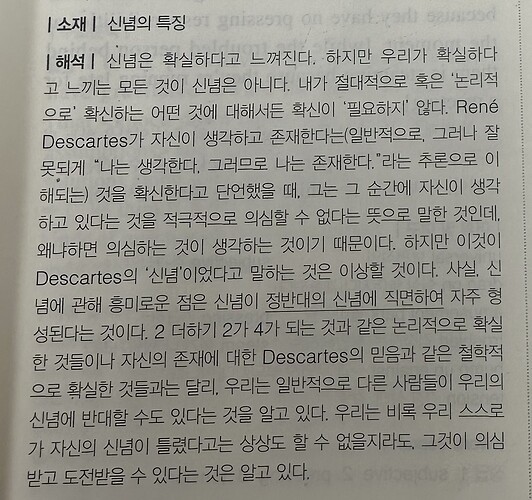Convictions feel certain. But not everything we feel certain about is a conviction. I don't need conviction for anything I'm absolutely or logically certain about. When René Descartes declared he was certain that he thinks and exists (popularly, but erroneously, understood as the inference "I think, therefore I am"), he meant he couldn't actively doubt he was thinking at that moment — because doubting is thinking. But it would be odd to say this was Descartes's conviction. Indeed, the interesting thing about convictions is that they are often formed in the face of opposite convictions. Unlike logical certainties like 2 and 2 make 4, or philosophical certainties like Descartes's belief in his own existence, we generally know that others may oppose our convictions. We are aware that our convictions can be doubted and challenged, even if we ourselves just cannot imagine that they are false.
이 지문에서 'I don't need conviction for anything I'm absolutely or logically certain about.' 한글 해석이 '나는 내가 절대적 혹은 논리적으로 확신하는 어떤 것에 대해서든 확신이 필요하지 않다.'라고 되어있습니다. 근데 이 부분에서 conviction과 certain 모두 '확신'이라고 해석을 한 것에 대한 의문이 듭니다. conviction을 신념, certain을 확실이라는 단어로 해석을 하는게 더 맞지 않나라는 생각이 드는데 다들 어떻게 생각하시는지 궁금합니다!
The poet Ralph Waldo Emerson famously noted that nothing good was ever
This is why there is an emotional component that comes along with
그리고 이 지문이 Lynch의 Know-it-all Society에서 발췌된 내용이라는 것을 알려주셨는데,
1개의 좋아요
